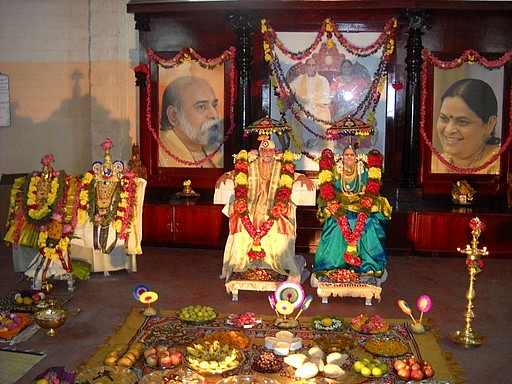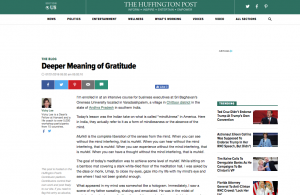I’m enrolled in at an intensive course for business executives at Sri Bhagavan’s Oneness University located in Varadaiahpalem, a village in Chittoor district in the state of Andhra Pradesh in southern India.
Today’s lesson was the Indian take on what is called “mindfulness” in America. Here in India, they actually refer to it as a form of mindlessness or the absence of the mind.
Muhkti is the complete liberation of the senses from the mind. When you can see without the mind interfering, that is muhkti. When you can hear without the mind interfering, that is muhkti. When you can experience without the mind interfering, that is muhkti. When you can have a thought without the mind interfering, that is muhkti.
The goal of today’s meditation was to achieve some level of muhkti. While sitting on a bamboo mat covering a stark white-tiled floor of the meditation hall, I was asked by the dasa or monk, Umaji, to close my eyes, gaze into my life with my mind’s eye and see where I had not been grateful enough.
What appeared in my mind was somewhat like a hologram. Immediately, I saw a scene of my father sweating, shaking and emaciated. He was in the midst of enduring the piercing needle-like stings of thousands of bumps of shingles covering his entire body. Before he died in 1997, he was undergoing chemotherapy and radiation to treat stage four non-Hodgkins lymphoma.
In that moment, I realized that what I did not have enough gratitude for was my father’s suffering. He suffered with every breath just so he could live a few more months. He struggled to stay inside of his body, instead of let go of his pain and ascend peacefully into the next world.
Suffering was his gift to me, his daughter and to his wife, my mother. It allowed us to say goodbye a bit longer than if had he ended his struggle sooner and passed on. In his suffering, he gave us the gift of life. It did not matter to him that in that for the time being, life meant suffering. The suffering did not matter. It was the life that mattered.
The dasa, Umaji, instructed me to say, “Thank you,” for this thing I was not grateful enough for. So I said to the memory of my father’s suffering soul, “Thank you for keeping yourself alive a few more months so that I could have a prolonged goodbye with you.”
Then, I watched the suffering stepped back. It was personified as a young man in a royal blue tunic and pants. His skin was a deep rich brown, full of life, like fertile unplanted soil. He bowed to me. I bowed to him. Tears poured from my eyes. He swiftly left, like the wind.
When the process was over, we danced. Umaji turned up the speakers and blasted the music. We danced, danced and danced to celebrate life and all of its gifts. 

